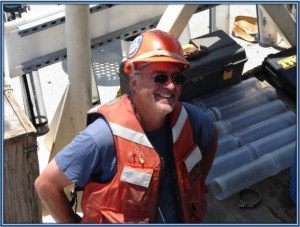Chris Moser
 Chris Moser currently works at Oregon State University as a Senior Faculty Research Assistant in the in the fields of Marine Geology and Geophysics. Chris received his B.S. in Geology at Dickenson College in Carlisle, PA. He later moved out to Oregon State to attend their Masters program, where he finished with an M.S. in Marine Geology. Upon completing his Masters, Chris wound up working with OSU as a Mooring Tech, where he would set up and deploy various sediment traps, current monitors, and other instruments for the purpose of both short and long term studies. After 15 years in that field, he ended up taking over for his mentor in the Coring Program at OSU and is working with the scientists to run the various core samplings on this expedition, as well as many other related projects.
Chris Moser currently works at Oregon State University as a Senior Faculty Research Assistant in the in the fields of Marine Geology and Geophysics. Chris received his B.S. in Geology at Dickenson College in Carlisle, PA. He later moved out to Oregon State to attend their Masters program, where he finished with an M.S. in Marine Geology. Upon completing his Masters, Chris wound up working with OSU as a Mooring Tech, where he would set up and deploy various sediment traps, current monitors, and other instruments for the purpose of both short and long term studies. After 15 years in that field, he ended up taking over for his mentor in the Coring Program at OSU and is working with the scientists to run the various core samplings on this expedition, as well as many other related projects.
Q: Have you always wanted to work in this field? Was there a defining moment in school or your childhood that guided you in this direction?
A: Geology has always come easily to me. Ever since I was 7 years old, I was always outside. We were the last house from the city, and the first house in the country, and we were building forts, catching fish, making dams, and just enjoying the world outside. I knew I could never be in a job where I would not have many opportunities to be outside, in the field. A defining moment came in my high school physics class where my teacher posed the question of: “How does the universe really work?” This sparked that long-innate interest I have had for exploration and understanding the way things work, while giving my focus an actual label. That teacher was the reason I chose to major in Physics when I first enrolled in college.
Q: What classes did you choose to take in HS? What were your majors in undergrad/grad school? Was there a favorite, least favorite?
A: I took the basics throughout high school. Math was a definite turn-off for me. I wasn’t really interested in the equations in science, but more so in understanding the way things were put together and what it was that made them function. This was really the reason why I changed my major from Physics to Geology; I wanted to get outside and study, not stay indoors. Learning more about Geology in undergrad continued to fuel my interest for the world around me. Marine Geology seemed like a great way to tie together the origins of our planet while maintaining research time outside. In pursuit of my Masters, I chose the programs at OSU to take my interests to the next level, not knowing Grad School should really be approached as an apprenticeship rather than more class time to figure out what your thesis focus would be. Through a series of non-geology related events, my future in this field was put into perspective. For some time, I lost sight of that excitement of discovery that drew me to this field in the first place. However, a course requirement that placed me in a 2nd grade classroom brought back the realization of where my heart truly was: out in the world, exploring. I found myself returning with a re-ignited interest to earn my Masters and stay in the field that I love so much.
Q: What bit of advice can you offer to our future scientists and explorers following on this blog?
A: Take in the whole picture when choosing your path, both in education and for a career. Figure out the type of person you are, and the type of environment you thrive in: if you cannot stand the being outdoors, maybe geology isn’t for you. Check out field experiences early on, and take advantage of those opportunities; they will help you narrow your focus of what you really like to do and what is just not for you. Finally, talk to the students of those you may want to study with. Find out if your work style and focus really go with what they are doing; there is no better person to get an insight from than someone already in the working or learning you might want to be in.


Recent Comments